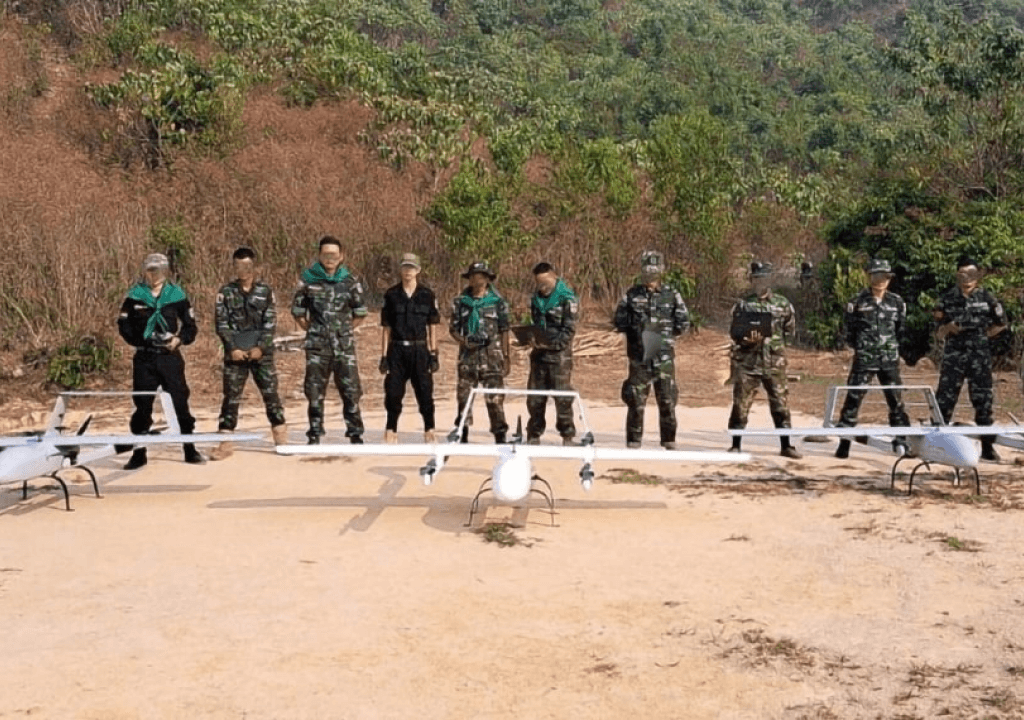Myanmar Civil War reaches a pivotal moment as the Opposition expands its assault on Naypyidaw, the Military Junta’s Capital. According to reports from Al Jazeera, the opposition forces, spearheaded by the National Unity Government (NUG), have intensified their assault on Naypyidaw, in their ongoing struggle against the military regime. Utilizing 30 drones, they claim to have successfully targeted the stronghold of the military regime. And as further hit, Since the junta’s seizure of power in June 2021, public resentment towards the government has reached new heights. The junta is encountering resistance from various pro-democracy factions and ethnic groups, which have seized territory along the Indian and Chinese borders, and the continuous loss for the military is turning to more support for the NUG from people. With a growing number of defections from the military ranks, Myanmar appears to be teetering on the brink of a democratic revolution.
Reports indicate that the Union government has conducted targeted drone attacks on two military installations in the capital, the headquarters of the military, and Alar airbase and on the residence of junta chief Min Aung Hlaing. According to statements from the National Unity Government (NUG), no casualties have been reported. Now, The opposition has increasingly turned to drone attacks, viewing them as cost-effective weapons against the coup regime. While the military government has labeled the opposition forces as terrorists, it has confirmed the attacks and claimed to have shot down seven drones. However, verifying information from both the military government and the NUG remains challenging.
The military finds itself in a defensive position as the Union government advances southward. With numerous adversaries across the country, the military is weakened and disoriented, suffering significant battlefield defeats in recent months. Reports suggest that soldiers are surrendering and defecting to the Union government, indicating a shift in allegiances. Even pro-military figures are expressing uncertainty and dissatisfaction amidst the prevailing confusion.
Simultaneously, the National Unity Government of the Republic of the Union of Myanmar Which is abbreviated as NUG, emerges as a cohesive force, established by the Committee Representing Pyidaungsu Hluttaw (CRPH), comprising elected lawmakers and parliamentarians ousted during the 2021 Myanmar coup d’état. It garners increasing public support and gains recognition as the legitimate government of Myanmar by the European Parliament. And maybe US and more western governments will follow the European Parliament. While powerful neighbors India and China are not participating much here, while some accuse China of having good terms with the Military government.
Comprising representatives from the Nobel Prize winner Aung San Suu Kyi’s National League for Democracy, ethnic minority insurgent groups, and various minor parties, the NUG operates effectively despite being in exile. Its diplomatic engagements, cooperation with ethnic factions, and governance initiatives reflect commendable efforts towards national unity and stability. And they hope and they are progressing to the removal of the Military Junta in the country and re establish democracy government in the country. It will be the great chapter of democracy in the modern world.
In Naypyidaw, the capital, the military government faces mounting apprehension over its diminishing strength. With significant losses in soldiers and persistent opposition, the recent announcement of imposing mandatory conscription reflects the military’s desperation in light of recent setbacks, including the surrender of entire battalions. This move for conscription has instilled fear among the younger population, leading many to seek ways to flee the country or seek refuge in resistance (Opposition) controlled areas.
As of the end of February 2024, the United Nations reports that over 2.4 million people have been internally displaced in Myanmar since the coup, while 59,300 individuals have fled to neighboring countries. The escalating humanitarian crisis underscores the severity of the situation and the urgent need for resolution.








